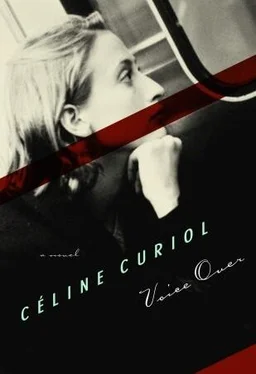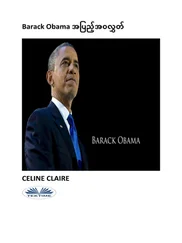Celine Curiol - Voice Over
Здесь есть возможность читать онлайн «Celine Curiol - Voice Over» весь текст электронной книги совершенно бесплатно (целиком полную версию без сокращений). В некоторых случаях можно слушать аудио, скачать через торрент в формате fb2 и присутствует краткое содержание. Год выпуска: 2008, Издательство: Seven Stories Press, Жанр: Современная проза, на английском языке. Описание произведения, (предисловие) а так же отзывы посетителей доступны на портале библиотеки ЛибКат.
- Название:Voice Over
- Автор:
- Издательство:Seven Stories Press
- Жанр:
- Год:2008
- ISBN:нет данных
- Рейтинг книги:5 / 5. Голосов: 1
-
Избранное:Добавить в избранное
- Отзывы:
-
Ваша оценка:
- 100
- 1
- 2
- 3
- 4
- 5
Voice Over: краткое содержание, описание и аннотация
Предлагаем к чтению аннотацию, описание, краткое содержание или предисловие (зависит от того, что написал сам автор книги «Voice Over»). Если вы не нашли необходимую информацию о книге — напишите в комментариях, мы постараемся отыскать её.
Voice Over — читать онлайн бесплатно полную книгу (весь текст) целиком
Ниже представлен текст книги, разбитый по страницам. Система сохранения места последней прочитанной страницы, позволяет с удобством читать онлайн бесплатно книгу «Voice Over», без необходимости каждый раз заново искать на чём Вы остановились. Поставьте закладку, и сможете в любой момент перейти на страницу, на которой закончили чтение.
Интервал:
Закладка:
They’ll leave the following weekend. When he announces it to her the next evening, there is no mistaking his change of heart. His voice is firmer, more cheerful than usual. Making up his mind to go away with her appears to have temporarily settled the matter for him, whereas previously his only response was to avoid her. Your ticket will come through the post. He arranges to meet her by the entrance to customs on Saturday morning at 8.30, half an hour before departure. Will that be OK? I don’t have a passport. He reminds her that she only needs her identity card, because of the EU. She knew about the existence of the European Union, but she hadn’t been aware of the passport thing. The free movement of goods and people, young lady; but that doesn’t mean you can forget your card. He tells her that it’s going to be good, really good, she’ll see. She gets a sudden, overwhelming urge to touch him through the receiver. See you Saturday, then.
She didn’t dare ask him what he’s going to tell Ange to justify his absence. Probably a lie similar to the one he told her. A business trip. But Ange won’t be waiting, at least not in the way she had, because when all is said and done Ange is the one he’ll go back to. Or maybe not. She smiles to herself. There is a mirror next to her, and she sees herself in it. Not quite the same face, at least different from the one she saw that day in the toilets at the bar. A somewhat troubling discovery. Not that she finds herself more beautiful or younger, feature by feature her face hasn’t changed at all. Yet she is more herself, closer to the ideal image of who she thinks she is. She shuts her eyes, opens them again, the impression persists. She wants to say hello, as if she were meeting herself for the first time, a bit nervous but fully intent on getting to know this new version of herself in the mirror. It didn’t occur to her to ask him how long they will be gone. To play it safe, she’ll ask for four days off.
She finds a nylon sports bag buried in a back corner of the hallway closet. With broad red and white stripes, a single zip, an adjustable strap, and tiny fluff balls of dust clinging to its edges. She doesn’t remember buying it. Or receiving it as a present. Or having put it away there, or ever having used it. It probably belonged to the previous tenant, who mislaid it or just left it there to get rid of it, too lazy or too guilty to throw it away. The presence of an abandoned bag in her apartment strikes her as an excellent omen. A bit on the small side maybe, yet without any visible defects. But if they are only going away for two days, which seems likely given the circumstances, she doesn’t need to take too much. And if by luck they were to prolong the adventure, she considers it equally sensible not to overburden herself.
She has laid out two piles of clothes on her bed. The essentials and the optionals. Panties, bras and socks are separate. In the pile of essential items is her talismanic black dress, worn the previous day at the brother’s apartment. She looks over the two mounds, trying to imagine herself in the streets of London wearing each outfit, like a model at an open-air fashion show. She would walk confidently, smiling as if she loved strutting about, and the delirious spectators would be applauding. She wonders if the English sulk as much as the French. She seems to remember that they have a reputation for being quite pale, because of the bad climate, that the men are blond and the women aren’t admired for any special physical traits. She decides to remove the red dress from the pile of optionals and stuffs it into a drawer. No point in carrying the memory of Maxime all the way to another country. She still has to eliminate a sweater and a pair of trousers before her travel wardrobe can fit inside the orphaned bag, which she has trouble calling her own. One hour later, the bag is ready. There was no need, of course, to get her things ready so soon. But this way she doesn’t run the risk of leaving something behind in the rush, which she would later regret having forgotten. She makes sure that her identity card is in her handbag. She puts the sports bag on the floor in the hallway so she can say to herself every evening on returning home from work, this is the proof that we’re going away. Two days later, the tickets are in her mailbox, satin-smooth, stiff, flawless. One Paris-London ticket, one London-Paris ticket. She reads everything that is printed on them, from the top left to the bottom right. There’s her name, the name of the two cities, the departure and arrival times, her carriage and seat number, the price, and all those figures whose meaning she has never understood. She counts on her fingers, happily realizing that she was right: they aren’t going away for two days but four. She carefully puts the tickets in her bag for safekeeping.
Outside the door to the men’s toilets, Mr. Merlinter is standing in front of her. You want to go away? He observes her with impatient eyes, which blink repeatedly as though he wanted to change the image on his retina that obstinately remains the same, in spite of his obvious efforts. This morning she happened to pass him in the hall and rather than going to see him in his office, which would have felt like an official visit and forced her boss to adopt an attitude appropriate to his rank, that is to say, busy and unbending, she preferred to approach him before he disappeared into the toilets, thereby offering the lovely possibility of keeping their talk short. Even though he isn’t supposed to involve himself in the private lives of his subordinates, Mr. Merlinter has not been able to resist the temptation. Feigning an air of detachment, he had to enquire just what she was intending to do with herself during the time off he might or might not give her. I need a holiday. She used the magic word on purpose. All the girls in her office say they need a holiday. Impossible therefore for him to fault her for the uniqueness of her request or the abnormality of her behavior. As well as blinking, Mr. Merlinter’s eyes are now darting back and forth between her and the toilet door handle. How many days? Four. She said the right number. The day before, after packing the previous tenant’s red and white bag, she had rehearsed her speech, so as not to be tempted to reduce it when confronted by her boss’ inquisitive look. Four. . Mr. Merlinter half-opens the door as if to confer with the people who might be inside. Mustn’t flinch now. Mr. Merlinter has one foot on the tiled floor. Four is fine, but even so check into whether you have that much time coming to you. Of course, she says. The door has already closed behind him.
She hesitates. Then, on the day before the trip, she decides to ask one of her co-workers, a fairly calm and courteous woman who sits to her right, if she has ever been to London. The woman ponders for a few seconds, surprised to be consulted on the matter or perhaps surprised that she is being consulted at all. It’s nice if you like to walk, there are monuments, but the people aren’t much fun and it rains all the time. No matter, they’ll stay indoors. In bars, which won’t be much of a change for them, or at the hotel, if in fact he’s planning for them to stay at a hotel. There must be plenty of museums, he’ll certainly want to go to them. She won’t refuse, even if she always ends up feeling painfully bored in such places, burdened by a sense of obligation to admire all the works on display. As for monuments, she’s not too keen on those either. Big Ben, that’s the name that comes up whenever London is mentioned. She imagines that it must be more or less what the Eiffel Tower is to Paris. She makes a mental note to slip her umbrella into the sports bag. One of the ribs has come loose, but it still keeps the rain off pretty well. They’ll just have to huddle together. He’ll put his arm around her neck, she’ll slip hers around his waist. A fine and beautiful cliché, worthy of the best romances of her age, which she will be all too happy to imitate.
Читать дальшеИнтервал:
Закладка:
Похожие книги на «Voice Over»
Представляем Вашему вниманию похожие книги на «Voice Over» списком для выбора. Мы отобрали схожую по названию и смыслу литературу в надежде предоставить читателям больше вариантов отыскать новые, интересные, ещё непрочитанные произведения.
Обсуждение, отзывы о книге «Voice Over» и просто собственные мнения читателей. Оставьте ваши комментарии, напишите, что Вы думаете о произведении, его смысле или главных героях. Укажите что конкретно понравилось, а что нет, и почему Вы так считаете.












